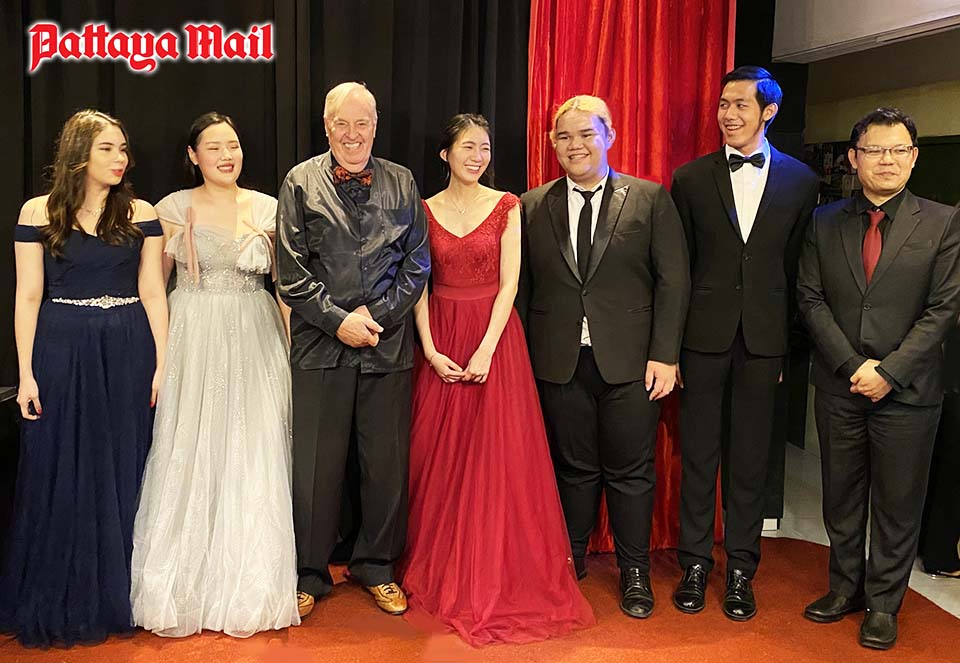
There’s an old saying among wine enthusiasts that the last glass of wine always tastes the best. While this may or may not be true, the performers at the recent concert at Ben’s Theater, to my mind at least, certainly saved the best until the end. The performers included five students of Professor Nancy Tsui-Ping Wei, voice teacher at the College of Music, Mahidol University. They’re also members of Nancy’s Voice Studio in Bangkok and their programme consisted of eighteen items, most of them arias from well-known operas.
The concert began with a duet for soprano and mezzo-soprano, described in The Grove Book of Opera as “one of the world’s most popular melodies”; the Barcarolle from Offenbach’s opera “The Tales of Hoffmann”. A barcarolle is a serenade traditionally sung by Venetian gondoliers or in this case, a song composed in that style. Pichamon Mookmaneekun (Kaimook) and Chanakan Amarangkun (Noon) gave a lovely lilting performance with good vocal blending, effective close harmony and secure intonation.
Noon was joined by Jatuphol Nuanjan (James) for the Mozart duet Là ci darem la mano from “Don Giovanni” in which both singers displayed excellent stage-presence, audience-contact and characterization. Jatupol Pinthip (Ohm) has sung at Ben’s Theater in the past but I found that his style and confidence have developed enormously since then. The song he chose, Mattinata (“Morning”) by Leoncavallo is interesting historically, because it was the first-ever song written specially for The Gramophone Company (the present-day EMI). Composed in 1904, it has since become a favourite concert piece for tenors. Ohm gave a compelling performance with a good dynamic range and excellent stage-presence.
Mozart’s Caro mio Druck und Schluck is a comic song for four voices from 1789. Roughly translated, the macaronic title means – somewhat suggestively – “My dear, squeeze and sip”. The singers gave a well-dramatized performance with fine ensemble singing in which Kaimook was splendid, while Ohm and James provided an amusing double-act. Rossini’s La Regata Veneziana (“The Venetian Regatta”) is an amusing duet in which the two singers are watching a boat race. Lila and Noon gave a delightfully animated and well-staged performance. Their singing was impeccable – good diction, a sense of ensemble and a full range of dynamics. I was also impressed with the performance of Mozart’s Soave sia il vento (“May the wind be gentle”) from Act I of the opera “Così fan tutte” in which the three singers wish the departing soldiers safe travels as their ship sails. Performed by Kaimook, Lila and James, their voices blended beautifully and their intonation was spot-on. James sang the rather tricky baritone part particularly well.
Composer Francesco Tosti is well-known for his songs and he’s a fascinating individual in his own right. In 1875 he travelled from his native Italy to London. There he mingled with the cream of English society and was singing master to the Royal Family. He became friendly with King Edward VII who later honoured him a knighthood. Tosti’s songs were tremendously popular in Britain at the time. Noon and Ohm gave an expressive and sensitive performance of the charming La Serenata and really brought out the lyrical quality of the music. Lila gave an expressive performance of Claude-Michel Schönberg’s song I Dreamed a Dream from “Les Misérables” and her phrasing, intonation and presence were commendable. She had clearly put a great deal of work into this song, but I felt it needed a bit more projection.
Throughout the concert, the piano accompaniment was provided by Siri Sranoi (Kwan) who played with admirable skill, sensitivity and superb musicianship. I was reminded of the British accompanist Gerald Moore, whose 1962 book entitled “Am I too loud?” reflects a perpetual concern of the accompanist. Sometimes, the piano part is not a mere “backing-track” but an integral part of the music but when you’re playing a digital piano with the speakers facing away from you, it’s difficult to judge the relative loudness. I felt that Siri’s splendid playing was often not loud enough. More volume might have helped the singers too, because they rely on the fixed pitch of the piano as a reference. Even so, Siri’s playing was exemplary throughout with a fine sense of style. He studied at the College of Music, Mahidol University, there he graduated with both Bachelor’s and Master’s degrees and he’s currently a full-time collaborative pianist there.
The singers also study at the College of Music of Mahidol University and have already won prizes for their achievements. Both Kaimook and Noon began studies there in 2019. Lila was born in Washington USA. Later, she studied viola but is now in her second year at Mahidol studying vocal performance. Ohm is from Rayong and first studied saxophone before he started specializing in voice. James originally studied classical trumpet but in 2020, shifted his major to vocal performance.
The second half of the concert began with one of those songs that everyone recognizes but few can name the composer. The song was O Sole Mio (“My Own Sun”) written in 1897 by the Neapolitan composer Eduardo di Capua. Performed by the full ensemble, there was a good sense of style though the louder sections struck me as a bit over-dramatic. Lila and Noon gave a splendid performance of Sous le dôme épais, better known as the “Flower Duet” from the 1883 opera “Lakmé” by Léo Delibes. The duet is sung by Lakmé and her servant Mallika as they go to gather flowers. In Britain it achieved fame in the 1980s thanks to its use in British Airways television commercials. Lila and Noon sang beautifully with a persuasive stage presence. Kaimook was excellent in Es lebt’ eine Vilja from Franz Lehár’s “The Merry Widow” in which the off-stage vocals added a touch of drama.
Paul Abraham’s operetta “Victoria and Her Hussar” was first performed in 1930 and the song Goodnight is a bitter-sweet melody, given a sensitive and thoughtful performance by Lila and Ohm. The voice-blending was perfect and Lila seemed at her best in this piece.
During the second half of the concert, there were several moments when the singers’ intonation was insecure, especially in the louder ensemble passages but his may have been simply due to fatigue.
Ohm sang La donna è mobile, that well-known showcase for tenors from Verdi’s “Rigoletto”. Verdi must have known he had a potential hit on his hands because the aria was rehearsed in total secrecy. Ohm gave an enthusiastic performance with good diction and a sense of style, which also came through in his singing of Lehar’s Lippen Schweigen (“Silent Lips”) later in the evening. Lila and Noon displayed splendid ensemble singing in their well-dramatized performance of Humperdinck’s Sandmännchen und Abendsegen from “Hänsel und Gretel”.
The final item on the programme was the famous drinking song Brindisi from Verdi’s “La Traviata”. Performed by four of the singers, it was a vigorous performance which generated enthusiastic applause from the audience. During the evening, I couldn’t help noticing that the louder the singing, the louder the audience applauded, which must mean something, though I am not entirely sure what.
For the encore, the full ensemble performed the wistful song Sure on this shining night written in 2005 by the American composer Morten Lauridsen. It’s a tranquil, timeless setting of a reflective short poem by James Agee. The performance was moving, emotionally charged and perfectly measured with superb ensemble singing. For me at least, it was one of the highlights of the entire evening.

 |
 |
 |




